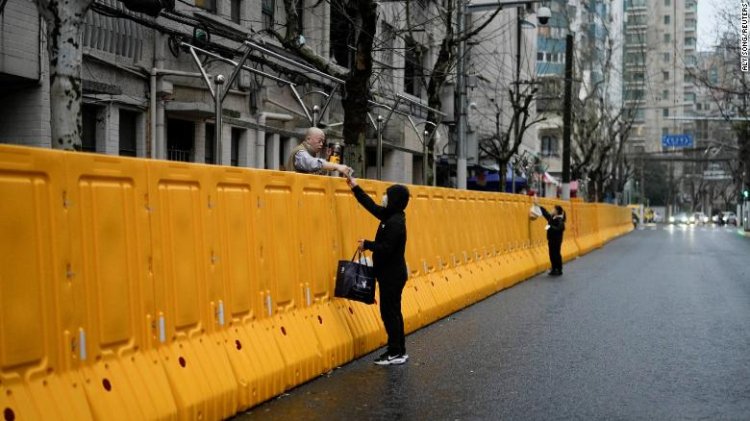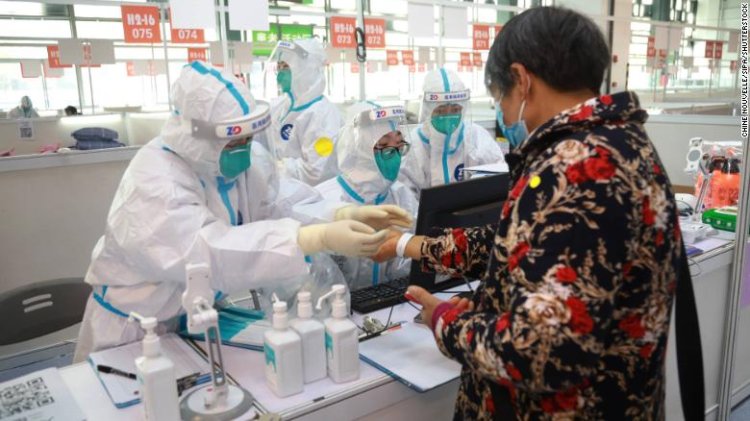Shanghai citizens are being forced into lockdown, causing panic at the store.
"A full city lockdown would've saved a lot of time and infections...(including) the psychological agony of being in a Covid ward," said Li, a resident of the eastern Pudong neighborhood. The change also crushed hopes that Shanghai's strategy would provide a less disruptive model for China's "zero-Covid" policy, at a time when Beijing has urged local authorities to minimize economic and daily life disturbances.

scuffles in the produce section, anxious consumers in the aisles, and shelves devoid of food
Uploaded videos to social media On Sunday, violent scenes erupted in Shanghai as authorities declared that a major portion of the city would be put on lockdown to prevent the spread of Covid-19.
The two-phase lockdown, which saw the eastern half of the city close at 5 a.m. Monday for four days of mass testing, with the western half following on Friday, comes as Shanghai became the new epicenter of China's largest Covid-19 outbreak in two years, with 3,500 cases reported on Sunday.
It's the first time such strict controls have been implemented in the 25-million-strong city, which serves as the country's financial hub and most cosmopolitan and progressive urban center, as the ruling Communist Party pursues a "zero-Covid" strategy to eradicate all infections.
Authorities in Shanghai had earlier stated that the city would not be placed under lockdown, even going so far as to probe individuals for "fabricating information" that suggested otherwise.
Instead, officials used a "slice-and-grid" technique, in which housing units were closed one at a time while occupants were checked. The local government went one step further on Sunday, announcing an east-west lockdown, putting citizens patience to the test who had already been through smaller-scale lockdowns. Some questioned why the city hadn't taken more comprehensive measures sooner.
"A full city lockdown would've saved a lot of time and infections...(including) the psychological agony of being in a Covid ward," said Li, a resident of the eastern Pudong neighborhood.
The change also crushed hopes that Shanghai's strategy would provide a less disruptive model for China's "zero-Covid" policy, at a time when Beijing has urged local authorities to minimize economic and daily life disturbances.
According to Yanzhong Huang, a senior fellow for global health at the Council on Foreign Relations in New York, doing so while being held responsible for any viral spread under "zero-Covid" was like being asked to fulfill "conflicting aims."
"Ultimately the local government officials have no choice but to do this heavy-handed approach to get things done in these circumstances," he said.

Purchasing in a panic
Chinese authorities made the announcement shortly after 8 p.m. Sunday, assuring people that local officials would guarantee enough supplies were available to sustain them through the testing period.
People panicked regardless, squeezing into markets that had to extend their hours to meet the demand.
Attempting to buy produce, according to one social media user on the famous Twitter-like platform Weibo, was like fighting a "lost battle," and compared the experience to the turbulence of the 1960s when food was limited.
Another resident, whose block had already been subjected to limited restrictions before the wider lockdown began, expressed concern that they would be unable to resupply and questioned the government's capacity to deliver enough food to the city.
Other Chinese cities have had trouble assisting citizens in the past as local authorities worked out the practicalities of lockdown. Residents in Xi'an were left without food late last year while the city was placed under a severe citywide lockdown, which was one symptom of a disastrous lack of planning that stunned the country at the time.
Gu Jun, director of the Shanghai Municipal Commission of Commerce, said at a press conference Monday that the city is "strengthening the organization of supply sources" in response to concerns about food shortages during the lockdown.
Crush in quarantine
Shanghai's expanding case numbers have put a further burden on the city's health care system, despite its tiny size by international standards.
Shanghai, like other Chinese cities, sends all persons who test positive to hospitals or quarantine centers, with no home quarantine allowed, regardless of the severity of symptoms.
According to Shanghai health officials, the city has already turned six hospitals, two indoor stadiums, and one exhibition center into government quarantine centers.
However, as the number of cases grows, worries about the living conditions in these centers have surfaced.
"Hundreds of people living in filthy conditions in the cold. Men and women are confined together in a room with no privacy. We had to use the public restroom and scurry for food. Is the quarantine truly beneficial to us? "According to one user's social media post, they were at a converted expo center.
Another person who was rushed to the hospital said they slept on the floor in an "airtight chamber" after receiving their diagnosis and had a "terrifying night."
"No one could tell us where or when they'd be transported," the user added, "just that more and more people were being brought in to be confined together."
Another user was taken aback by the fact that this could be happening in one of the country's most developed cities.
"Shanghai's anti-epidemic policy is to lock people up first, then figure out what to do next. No one provided us medicine, and no one gave us doctors. The patients are shivering on the ground "the user expressed himself. "Is this the Shanghai that the people were accustomed to?"

 Boakyewaa Lawrencia
Boakyewaa Lawrencia 


































